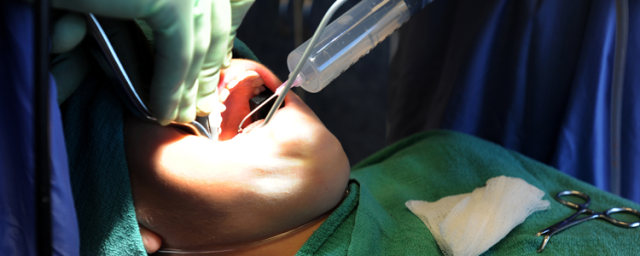
Teeth extractions are often necessary to eliminate pain or increase oral health if a tooth is damaged or infected. Wisdom teeth extractions are often beneficial whether you have pain right now or not. Having the right dental care can make the process more comfortable, safe and effective when you need a tooth removed. In many cases, our dentist can save damaged or infected teeth. However, when removal is the best option, you can count on us to do it in the most advantageous way for you.
Reasons for Tooth Extractions
Our dentist does not take tooth removal lightly. We know that losing teeth can cause oral and medical health problems in the future. That is why we take extra care in examining the tooth and diagnosing your problem before we resort to tooth extraction. Yet, tooth removal may be the best choice if:
- Your teeth are too crowded and you are preparing to begin orthodontia.
- You have injured a tooth severely.
- You have such extensive decay in a tooth that it can’t be saved with a filling or crown.
- A tooth has become too infected for successful treatment with root canal therapy or antibiotics.
Reasons for Wisdom Tooth Extractions
Wisdom teeth removal is a very common procedure. Usually around the age of 30, people have their wisdom teeth removed as a preventative measure or to solve a dental problem. It isn’t always necessary to remove them. Your dentist can examine your teeth and help you make the decision.
Some of the specific reasons to have your wisdom teeth removed include:
- Your jawbone is not large enough to accommodate the wisdom teeth and they are too crowded.
- Your wisdom teeth are impacted and can’t come in all the way.
- You have decay or infection in them.
- You can’t reach to the back of your mouth to clean them properly.
- Your wisdom teeth are pushing on and damaging other teeth.
- The teeth are damaging your jaw.
- The teeth are causing sinus problems.
- Your gums around the wisdom teeth become inflamed.
- The eruption of the wisdom teeth is undoing the effects of prior orthodontic treatments.
The Extraction Process
Your dentist begins the procedure by giving you a local anesthetic. Once you are numb, the extraction process can begin. For a simple extraction, your dentist uses a dental tool called an elevator to loosen the tooth. Then, they use forceps to remove the tooth completely. If the tooth is broken, our dentist may need to remove each piece individually. For wisdom teeth and other complex extraction, the dentist may need to cut away the gums before extracting the tooth.
Aftercare
Once the tooth is removed, you will need to take special care to ensure the health of the tooth’s socket, allow it to heal, and prevent infection. Follow your dentist’s orders, which may include:
- Biting down on gauze until the bleeding stops.
- Taking painkillers as directed.
- No drinking through a straw.
- No eating hard or sticky foods.
- Applying ice to prevent swelling.
- No forceful rinsing or spitting.
- No smoking.


